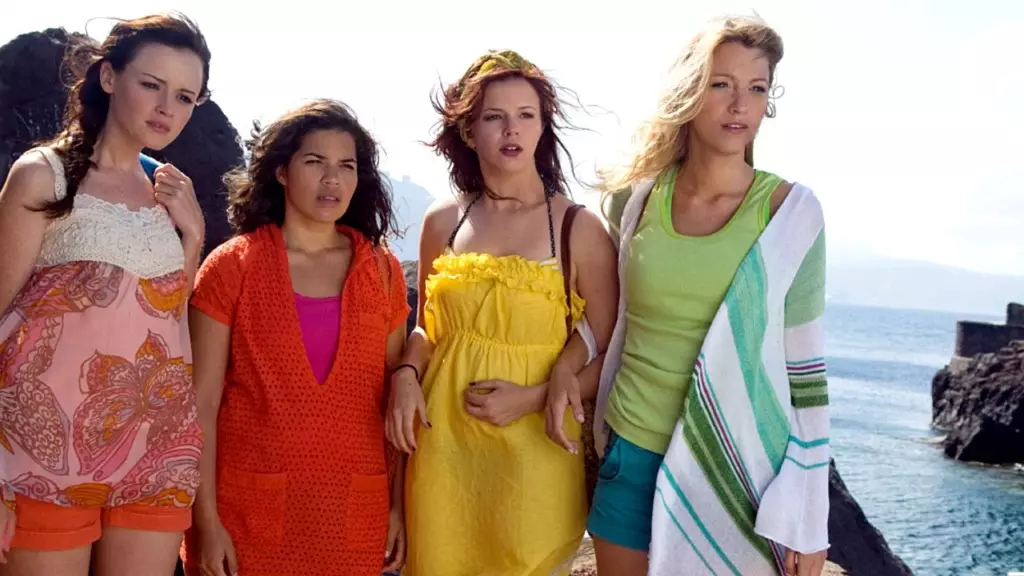In the aftermath of serious allegations against Justin Baldoni, the director of the film adaptation of Colleen Hoover’s novel *It Ends With Us*, a striking example of female solidarity has emerged from the cast of the beloved 2005 film, *The Sisterhood of the Traveling Pants*. Actors America Ferrera, Amber Rose Tamblyn, and Alexis Bledel have rallied behind their co-star Blake Lively, who has publicly filed a lawsuit detailing allegations of sexual harassment and a subsequent smear campaign targeting her reputation. Their collective letter serves not only as support for Lively but also as a reflection of the frequently adversarial dynamics women confront in professional spaces, particularly in the entertainment industry.
Lively’s brave choice to come forward illustrates the complex landscape that women must navigate when advocating for their rights within a work environment. In their public statement, Ferrera, Tamblyn, and Bledel emphasized their longstanding relationship with Lively—spanning over two decades—underscoring the importance of community and advocacy among women. Their message encapsulates the essence of female friendship: standing together in the face of injustice, a sentiment that resonates deeply in a society where women’s voices have historically been sidelined.
What makes this situation particularly poignant is the disconnect between the film’s narrative and the reality faced by its leading actress. The project’s premise centers around themes of domestic violence and the resilience of women; however, the director’s alleged actions starkly contradict the very principles the film espouses. Lively’s allegations paint a troubling picture, revealing not only a disregard for her comfort and safety on set but also a calculated attempt by Baldoni and his team to undermine her. This hypocrisy is further aggravated by Baldoni’s self-identification as a feminist ally, raising critical questions about the accountability of male allies in creative industries.
These revelations spur necessary conversations about the systemic challenges women face when claiming their right to a safe work environment. The actress’s decision to assert herself in the face of what she describes as “disturbing behavior” on set exposes the pervasive culture of silence and complicity that often exists in Hollywood. It calls into question what it truly means to be an ally and whether claims of support can be trusted when actual behavior contradicts those assertions.
The mental and emotional impact of such experiences can be profound. Lively’s account of feeling “ogled and exposed” while trying to articulate her discomfort highlights the burden women often carry when addressing harassment. Their bravery can indeed be further fettered by the fear of retaliation, an atmosphere that many women navigate in various professional fields. By taking the courageous step to voice her concerns, Lively demonstrates an admirable level of resilience but not without personal cost.
The ramifications of these allegations extend beyond just Lively and Baldoni; they provide a crucial opportunity for broader dialogues on workplace safety, the enduring struggles against harassment, and the power of speaking out. The support from her peers emphasizes an essential aspect of this battle—community backing, which lends strength to individual voices.
As news of the lawsuit unfolds, the fallout has already begun for Baldoni, who was dropped from his agency, WME. This swift action suggests a recognition of the seriousness of the claims against him. The public nature of these allegations encourages a re-examination of how institutions handle claims of misconduct, especially regarding high-profile individuals. The response from author Colleen Hoover, who affirmed Lively’s character and integrity, further reinforces the necessity of supportive relationships amid adversity.
The solidarity shown by Ferrera, Tamblyn, and Bledel stands as a beacon of hope in an industry that too often casts women into shadows. Their letter promotes not just awareness but instills a sense of empowerment. By collectively raising their voices, they challenge the existing norm and encourage others to practice accountability and support within the industry. In times rife with accusations and denials, such sisterhood can pave the way for meaningful change, ensuring that women’s stories and experiences take center stage rather than being relegated to the background.


Leave a Reply